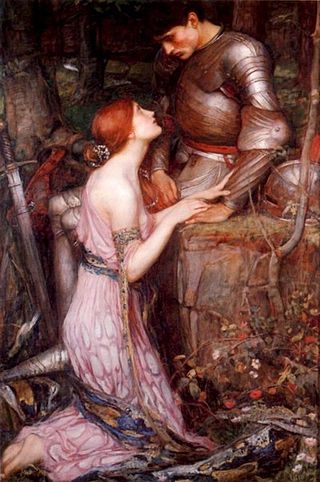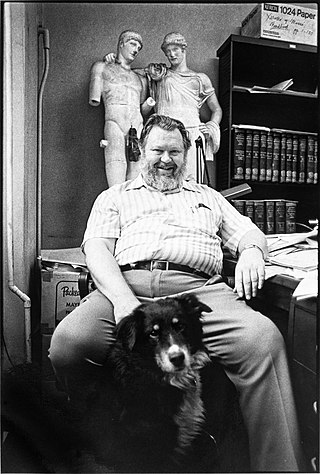
The Dark Ages is a term for the Early Middle Ages, or occasionally the entire Middle Ages, in Western Europe after the fall of the Western Roman Empire that characterises it as marked by economic, intellectual and cultural decline.
Medieval studies is the academic interdisciplinary study of the Middle Ages.

Rosamond Deborah McKitterick is an English medieval historian. She is an authority on the Frankish kingdoms in the eighth and ninth centuries AD, who uses palaeographical and manuscript studies to illuminate aspects of the political, cultural, intellectual, religious, and social history of the Early Middle Ages. From 1999 until 2016 she was Professor of Medieval History and director of research at the University of Cambridge. She is a Fellow of Sidney Sussex College and Professor Emerita of Medieval History in the University of Cambridge.

Charles Homer Haskins was a history professor at Harvard University. He was an American historian of the Middle Ages, and advisor to U.S. President Woodrow Wilson. He is widely recognized as the first academic medieval historian in the United States, and the Haskins Medal was named in his honor.
Gustave Reese was an American musicologist and teacher. Reese is known mainly for his work on medieval and Renaissance music, particularly with his two publications Music in the Middle Ages (1940) and Music in the Renaissance (1954); these two books remain the standard reference works for these two eras, with complete and precise bibliographical material, allowing for almost every piece of music mentioned to be traced back to a primary source.
Norman Frank Cantor was a Canadian-American historian who specialized in the medieval period. Known for his accessible writing and engaging narrative style, Cantor's books were among the most widely read treatments of medieval history in English. He estimated that his textbook The Civilization of the Middle Ages, first published in 1963, had a million copies in circulation.

The Wichita Eagle is a daily newspaper published in Wichita, Kansas, United States. It is owned by The McClatchy Company and is the largest newspaper in Wichita and the surrounding area.
The Birmingham Post is a weekly printed newspaper based in Birmingham, England, with a circulation of 2,545 and distribution throughout the West Midlands. First published under the name the Birmingham Daily Post in 1857, it has had a succession of distinguished editors and has played an influential role in the life and politics of the city. It is currently owned by Reach plc. In June 2013, it launched a daily tablet edition called Birmingham Post Business Daily.

Medievalism is a system of belief and practice inspired by the Middle Ages of Europe, or by devotion to elements of that period, which have been expressed in areas such as architecture, literature, music, art, philosophy, scholarship, and various vehicles of popular culture. Since the 17th century, a variety of movements have used the medieval period as a model or inspiration for creative activity, including Romanticism, modern paganism, the Gothic revival, the pre-Raphaelite and arts and crafts movements, and neo-medievalism.

Lynn Thorndike was an American historian of medieval science and alchemy. He was the son of a clergyman, Edward R. Thorndike, and the younger brother of Ashley Horace Thorndike, an American educator and expert on William Shakespeare, and Edward Lee Thorndike, known for being the father of modern educational psychology.
Louis Francis Salzman was a British economic historian who specialised in the medieval period.
Ingrid Brainard was a musicologist, dance historian, performer, and teacher of historical dance. She contributed significantly to the development of the fields of dance history in general and early dance history in particular.

The Rare Book & Manuscript Library is principal repository for special collections of Columbia University. Located in New York City on the university's Morningside Heights campus, its collections span more than 4,000 years, from early Mesopotamia to the present day, and span a variety of formats: cuneiform tablets, papyri, and ostraca, medieval and Renaissance manuscripts, early printed books, works of art, posters, photographs, realia, sound and moving image recordings, and born-digital archives. Areas of collecting emphasis include American history, Russian and East European émigré history and culture, Columbia University history, comics and cartoons, philanthropy and social reform, the history of mathematics, human rights advocacy, Hebraica and Judaica, Latino arts and activism, literature and publishing, medieval and Renaissance manuscripts, oral history, performing arts, and printing history and the book arts.

The International Medieval Congress (IMC) is an annual academic conference held for scholars specializing in, or with an interest in, the study of the European Middle Ages. It is organised and administered by the Institute for Medieval Studies at the University of Leeds and is held in early July. The Congress is the largest annual conference in any subject in the UK, regularly attracting over 2000 registered participants, and has been used in some research as a barometer for trends in Medieval Studies generally. In 2020 and 2021 the conference was held online due to restrictions to manage the COVID-19 pandemic.
Kenneth Meyer Setton was an American historian and an expert on the history of medieval Europe, particularly the Crusades.

European science in the Middle Ages comprised the study of nature, mathematics and natural philosophy in medieval Europe. Following the fall of the Western Roman Empire and the decline in knowledge of Greek, Christian Western Europe was cut off from an important source of ancient learning. Although a range of Christian clerics and scholars from Isidore and Bede to Jean Buridan and Nicole Oresme maintained the spirit of rational inquiry, Western Europe would see a period of scientific decline during the Early Middle Ages. However, by the time of the High Middle Ages, the region had rallied and was on its way to once more taking the lead in scientific discovery. Scholarship and scientific discoveries of the Late Middle Ages laid the groundwork for the Scientific Revolution of the Early Modern Period.
The Arizona Center for Medieval and Renaissance Studies (ACMRS) was established in 1981, by the Arizona Board of Regents as a state-wide, tri-university research unit that bridges the intellectual communities at Arizona State University, Northern Arizona University, and the University of Arizona. Located centrally on the campus of Arizona State University, ACMRS is charged with coordinating and stimulating interdisciplinary research about medieval and early modern literature and culture.
Jan Ziolkowski occupies the Arthur Kingsley Porter Professorship of Medieval Latin at Harvard University. From 2007 to 2020 he served as Director of the Dumbarton Oaks Research Library and Collection. His scholarship has focused on the literature, especially in Latin, of the Middle Ages.

Colin Robert Chase was an American academic. An associate professor of English at the University of Toronto, he was known for his contributions to the studies of Old English and Anglo-Latin literature. His best-known work, The Dating of Beowulf, challenged the accepted orthodoxy of the dating of the Anglo-Saxon poem Beowulf—then thought to be from the latter half of the eighth century—and left behind what was described in A Beowulf Handbook as "a cautious and necessary incertitude".

Robert Earl Kaske was an American professor of medieval literature. He spent most of his career at Cornell University in Ithaca, New York, where he was the Avalon Foundation Professor in the Humanities, and where he founded one of the preeminent medieval studies graduate programs in North America. His published output included lengthy interpretations of Beowulf and of poems and passages by Dante and Chaucer, and frequently constituted leading studies. Kaske particularly enjoyed solving cruxes, with articles on problematic passages in works such as Pearl, Piers Plowman, the Divine Comedy, The Husband's Message, The Descent into Hell, and Beowulf.










